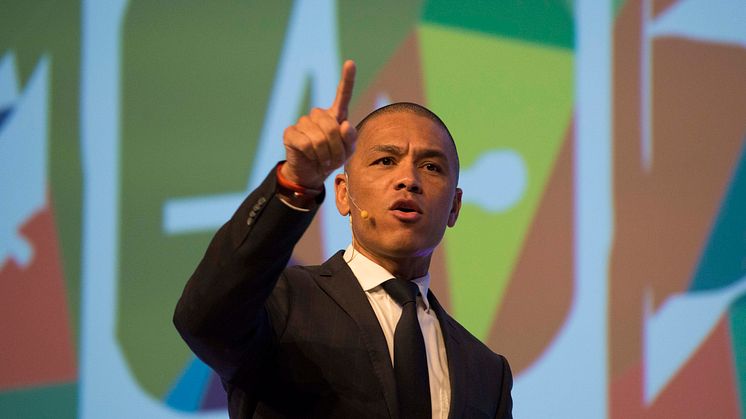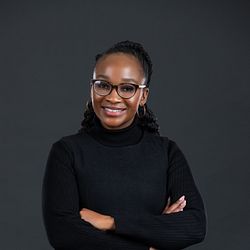
Press release -
Real-time and ubiquitous – technology is unlocking human potential
Real-time and ubiquitous – technology is unlocking human potential
Technology entrepreneur and former country manager of Google South Africa, Stafford Masie presented the third session at the Vitality Summit today, titled “The future of health and wellness technology”, introducing the theme of the session by quoting researcher and scientist Roy Amara: “We tend to overestimate the effect of a technology in the short run and underestimate the effect in the long run”.
Masie says he is often asked where technology is going, and to predict the next ‘big thing’. This question, he argues, is already misunderstanding the impact technology will have on our future. Instead, we should draw out the principles and learnings from the past that point to where things are going. “The fact is we don’t know [what the future of tech is],” says Masie, “but the genie is out of the bottle.”
“Technology is enabling abundance in everything,” he says. And this abundance creates the resulting business model. “I think the health and wellness world is the next big vertical to be interrupted by technology.”
Masie presented a different interpretation of the history of technology, and even hacking, arguing that the first time early humans used speech they were “interfacing” and “sharing data”. He takes this further with the example of electricity which he characterises as a novelty, non-commercial discovery until “hackers” monetised it, charging punters at fairgrounds “a penny a piece” to touch an electrified orb and experience this literally hair-raising “magic”. When electricity began to unlock human potential is when it disappeared, he argues, when electricity goes to the home, when the ACDC current was standardised and could be used through any outlet, any machine. “The future of technology is the death of technology,” he says, “or at least the death of the visualisation of technology. When it disappears, it establishes its abundance.”
Now we are in what Masie calls the “fashion stage” of health and wellness technology – with the growing popularity of “glowing rectangles” and wearable activity-monitors, like the FitBit and Jawbone devices. But soon, he promises, the visual evidence of technology will disappear and then we will really unlock the wellness potential, a future of “computer human symbiosis”, he promises.
Masie characterises the coming watershed moment as the “Google moment” rather than the “iPhone moment” – arguing that instead of looking for the game-changing device, the real innovation will lie in a way to collate, correlate, and make sense of the data, the connections and the information we are creating. “Collation of data is key,” Masie says.
This is why, he argues, people needn’t fear ubiquitous computing. It is people-driven, “people disclosing things about ourselves”, people putting their data into the system and demanding the ability to control their own data – like their medical information. He predicts a shift away from the institutional towards the individual in this way. And from there, people will innovate. Quoting Tim O’Reilly, Masie says the current situation is that 1% of spend goes to diagnostics, 99% to treatment, but “I posit that this will be inversed in the next five years,” he says.
Driving this, he acknowledges, is the Internet of Things – or ubiquitous connectivity, but again this maverick urges us to rethink this concept, calling it the Internet in Things. “Machines do very little without us, they require us. We need to input data,” but instead of large physical computers with numerous separate components, “the computer is disappearing” and we are entering a future of a connectedness. Already there are 5 billion cellphones in the world – more than there are cars, PCs, TVs, and credit cards combined. Through sensors, phones, and other tech, “inanimate objects speak to us” says Masie, and “they – sensors – change human behaviour through real time, prompts, because people can see the consequence of their behaviour.”
The next step, locally at least, says Masie, is to become innovators ourselves, “We need to change this [South African] culture away from consumption to creation”. He says, instead of getting your kids a new phone, give them open source technology so they can build the next iPad.
“Let the kids hack the electronics in your home” and that will – ultimately – contribute to and build the future of our wellness and health technology, of all our technology and humanity’s tomorrow.
Topics
Categories
Discovery information
About Discovery Limited
Discovery Limited is a South African-founded financial services organisation that operates in the healthcare, life assurance, short-term insurance, savings and investment products and wellness markets. Founded in 1992 by the current Group Chief Executive Officer Adrian Gore, Discovery was guided by a clear core purpose – to make people healthier and to enhance and protect their lives. Underpinning this core purpose is the belief that through innovation Discovery can be a powerful market disruptor.
The company, with headquarters in Johannesburg, South Africa, has expanded its operations globally and currently serves over seven million clients across South Africa, the United Kingdom, the United States, China and Singapore. Vitality, Discovery’s wellness programme, is the world’s largest scientific, incentive-based wellness solution for individuals and corporates. The global Vitality membership base now exceeds 5.5 million lives in five markets.
Discovery is an authorised financial services provider. It trades on the Johannesburg Securities Exchange under the code “DSY”.
Follow us on Twitter @Discovery_SA







